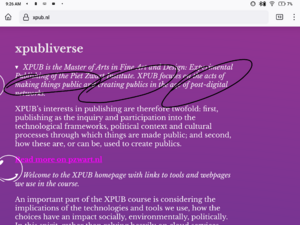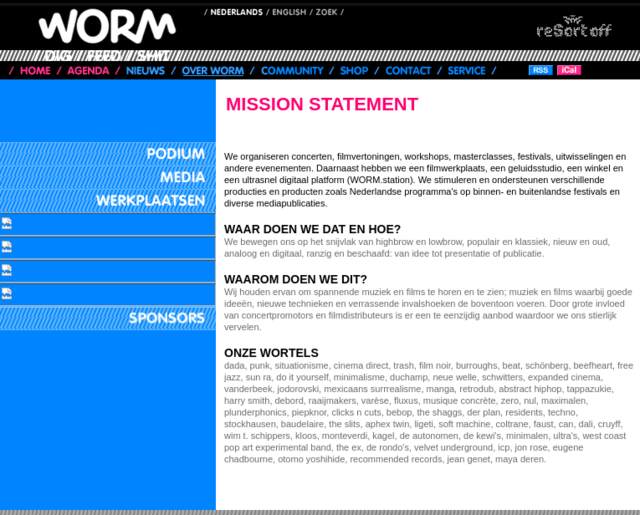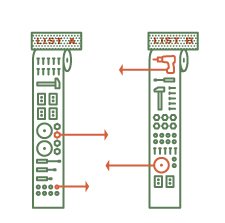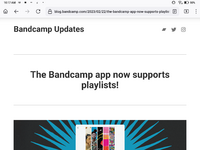Radio Worm: Protocols for an Active Archive (Week 1)
XPUB + Radio WORM?
XPUB
XPUB is the Master of Arts in Fine Art and Design: Experimental Publishing of the Piet Zwart Institute. XPUB focuses on the acts of making things public and creating publics in the age of post-digital networks.
XPUB’s interests in publishing are therefore twofold: first, publishing as the inquiry and participation into the technological frameworks, political context and cultural processes through which things are made public; and second, how these are, or can be, used to create publics.
- XPUB/Media Design + WORM have worked together in the past
WORM
WORM is the ultimate test environment for alternative art production, experimental ways of living and non-academic knowledge development. We are a network organisation at the intersection of (popular) culture and (performing) arts, fueled by an abiding interest in all the inspiring, beautiful, urgent, vital, raw, unruly and / or crazy shit that our fellow human beings come up with. We do not see the chaos that comes with it as a problem; rather we use it as energy for action.
Radio WORM
Radio WORM is an online radio platform at the heart of WORM Rotterdam. Our studio hosts audio production of all descriptions, with over 80 resident shows as well as a shifting schedule of one-off events, mini-series and special guests.
Sound art, experimental music, interviews, mixes, informal reporting and in-depth talk-based series all find their place here: we’re always looking for what doesn’t fit anywhere else.
After nearly a decade’s absence, Radio WORM (Mark 2) came into existence during 2019, when Lieuwe Zelle and Lukas Simonis began broadcasting from the WORM office. After COVID struck, a small crew of broadcasters moved to the Pirate Bay booth, where the radio service has since expanded with an ever-growing list of shows.
source: https://radio.worm.org/
Protocols: How Control Exists after Decentralization
At the core of networked computing is the concept of protocol. A computer protocol is a set of recommendations and rules that outline specific technical standards. The protocols that govern much of the Internet are contained in what are called RFC (Request For Comments) documents. Called “the primary documentation of the Internet,” these technical memoranda detail the vast majority of standards and protocols in use on the Internet today.
... Other protocols are developed and maintained by other organizations. For example, many of the protocols used on the World Wide Web (a network within the Internet) are governed by the World Wide Web Consortium (W3C). This international consortium was created in October 1994 to develop common protocols such as Hypertext Markup Language (HTML) and Cascading Style Sheets.
...Protocol is not a new word. Prior to its usage in computing, protocol referred to any type of correct or proper behavior within a specific system of conventions. It is an important concept in the area of social etiquette as well as in the fields of diplomacy and international relations. Etymologically it refers to a fly-leaf glued to the beginning of a document, but in familiar usage the word came to mean any introductory paper summarizing the key points of a diplomatic agreement or treaty.
...Yet instead of governing social or political practices as did their diplomatic predecessors, computer protocols govern how specific technologies are agreed to, adopted, implemented, and ultimately used by people around the world. What was once a question of consideration and sense is now a question of logic and physics.
Source: Introduction, pp 6-7, Protocol: How Control Exists after Decentralization, Alexander Galloway (2004)
Burnstation (2003)
Active Archives (2006)
Activating the archive?
Manifesto for an Active Archive

- Contrast of monolithic platforms to protocols, (open) formats and standards, and diverse and interchangeable tools.
Free Software?
Using and inspired by existing F/LOSS (free/libre open source software) but also things like Wikis & git where sources are versioned and shared.
- The freedom to run the program, for any purpose
- The freedom to study how the program works, and adapt it to your needs. Access to the source code is a precondition for this.
- The freedom to redistribute copies so you can help your neighbor.
- The freedom to improve the program, and release your improvements to the public, so that the whole community benefits. Access to the source code is a precondition for this.
sources: aa presentation (2018), gnu philosophy
Active Archives: 2023?
- Active Archives Galaxy (2018), from Femke
- The project itself became more of a generator for other projects and works, often in neighboring networks...
Kurenniemi: Spectrum sort
https://activearchives.org/mw/index.php?title=Spectrum_sort (audio files missing!)
La Langues Schaerbeekoise / Spreekt-u Sint-Gillis
An example "spin-off" project from Active Archives that very much worked as a generator for engaging with different publics, practices, and formats.
Forms of engagment / inputs and outputs:
- Radio programs (Radio Alma(BE) + Radio Panik(BE) + Radio Campus(Paris))
- Workshops / Meetings with cultural groups
- Publications: Woorden uit de Berenkuil (2012) + Parlez-vous 1060 (2016)
- Exhibition
- Radio walk (Anna Raimondo) and later in Vienna
An adapted format for long term archival access
Both websites were based on dynamic database-driven backends (python + django) when actively developed; The sites were later adapted into static HTML (+JS+CSS) for longevity and easier maintenance in a "frozen" state.
Protocols?
- Questioning authorship
- Interogating ontologies
- Collectivity on (our) own terms
Ursula Franklin: Technologies of control
Trimester plan
See also... (from the XPUB/Media Design archives)
- Interfacing the law (2017), Interfacing the law (2018), Interfacing the law (2019), online library list (notes from 2018)
- OuNuPo (2018)
- Radio Implicancies (2020-2022)
- Tape+Loop (2014)






